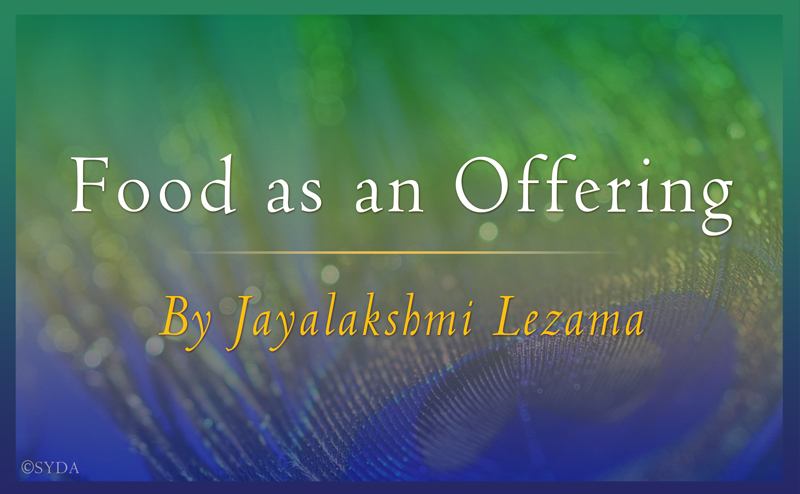Food as an Offering
by Jayalakshmi Lezama
Siddha Yoga Celebration Satsang
in Honor of Baba Muktananda’s Mahasamadhi
Saturday, October 31, 2020

Namaste!
Me da gusto saludarlos a todos en la Sala Universal de Siddha Yoga.
I am happy to greet everyone in the Siddha Yoga Universal Hall.
We are participating together in this satsang entitled Habita en el Reino del Reposo Divino (Reside in the Realm of Divine Repose). My name is Jayalakshmi Lezama, and I offer seva as the supervisor in the Annapurna Kitchen in Shree Muktananda Ashram.
Baba Muktananda gave the name Annapurna to the kitchens of all Siddha Yoga Ashrams. Some of you may wonder why. In the Indian tradition, the goddess Annapurna is the giver of food and nourishment.

In India, there is an ancient tradition to first offer the food to God before anyone partakes of it. On the Siddha Yoga path, we observe this tradition by first offering food to our beloved Shri Guru, and only after this offering has taken place, do we eat the food for ourselves. This sacred offering is called naivedya.
Today, I will be offering naivedya to the murti of Bhagavan Nityananda.
The root word of naivedya is ni-vid, which means “to make known” or “to make something manifest or visible.” Therefore, performing naivedya is a beautiful way to make our love for Shri Guru visible and tangible.
Food for naivedya is prepared and offered with utmost reverence. Baba and Gurumayi have taught us to repeat God’s name while cooking. In Annapurna, we begin the day reciting sacred mantras; then a kirtan or a chant is played while food is being prepared. In this way, the food is infused with the vibrations of God’s name.
When preparing the food that will be offered to Shri Guru, we hold in our awareness our love for them. We prepare their favorite dishes, so they may be pleased. We serve the food in the most beautiful and elegant dishes.
Food prepared in this way is worthy of offering to Shri Guru as naivedya.
Today, I will offer naivedya to Bade Baba. I will offer upma, which is a savory South Indian dish, and Siddha Coffee, which Baba created in honor of his Guru, Bade Baba, who loved black coffee.
I will also offer sweet and fragrant milk boiled with nuts and spices like cardamom, nutmeg, and saffron. This spiced milk is customarily prepared on Sharad Purnima, the full moon in the month of October. Sharad Purnima is also known as Kojagari Purnima in Maharashtra, India. People stay awake all night as it is believed that on this night Goddess Lakshmi visits her devotees and blesses them. Traditionally, Shri Lakshmi is honored with an offering of “moon milk,” which has been set out under the full moon to absorb its nourishing rays.

The Indian scriptures say that when naivedya is offered, the deity receives the food through the element of air. It is said that the deity listens to the intention and prayer of the one who offers the food. When the ritual concludes, the food that was offered is mixed with the rest of the food and served to everyone as prasad, blessed food.
It is customary to recite mantras during the offering of naivedya. Today we will listen to the hymn Nagendra Haraya, which is also known as the Shiva Panchakshara Stotram. Om Namah Shivaya, the initiation mantra of the Siddha Yoga path, is often called the panchakshara mantra, the “five-syllabled mantra.” Om, the primordial sound, is not counted as a syllable. The verses of this hymn extoll the qualities of Lord Shiva, the mantra’s deity, associating those qualities with each of the mantra’s five syllables.
Jayalakshmi then made the sacred offering of naivedya.



